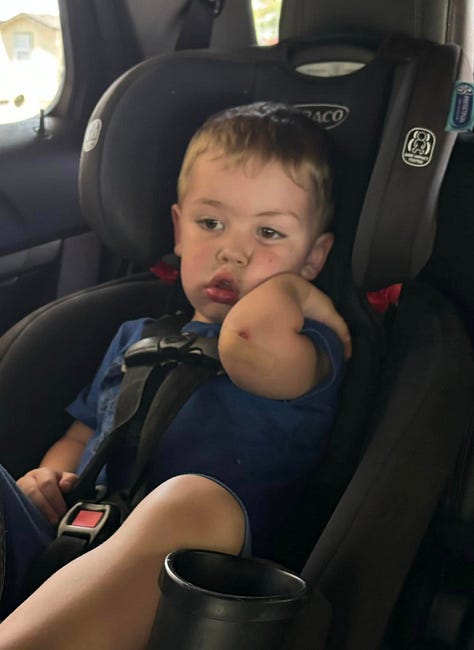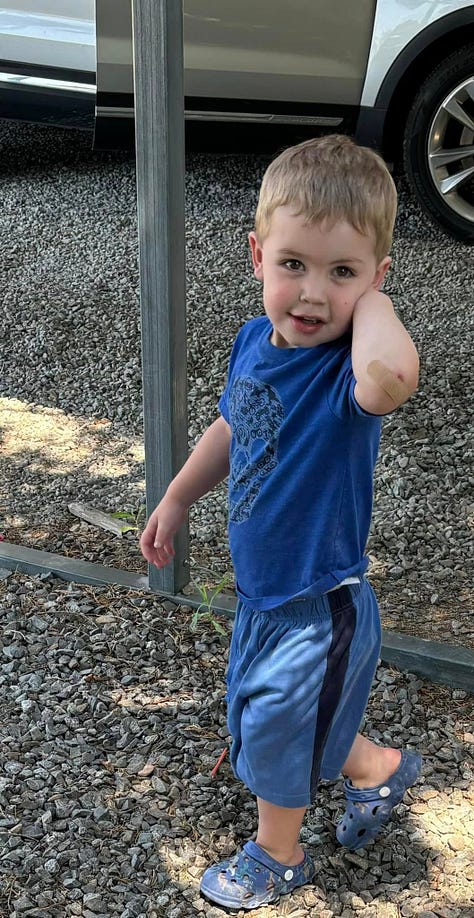One of my very favorite things about Facebook is the “memories” function. For those of you who aren’t perpetually online like me and have no idea what I’m talking about, the memories function is a feature on the Facebook platform that allows users to see, at a glance, the photos, posts, videos, and other activities they shared on social media on any given day of the previous years. It invites you to track your progress and evolution (or regression) as a human across the years.
Sometimes the memories can make you cringe, as was the case when I encountered a particularly navel-gazey angst written poem I wrote in college. Sometimes they can make you cry—like when you’re presented with photos of old friends who are no longer in your life for one reason or another.
This morning when I logged on, I saw a post that made me laugh. It was a series of photos from last year when my then 2-year-old Maverick took a tumble and got a gnarly rugburn on his elbow. It happened at 8:30 in the morning. He seemed to interpret the injury as a personal assault on his dignity, and throughout the day, he never once stopped nursing his wound, keeping his elbow up at an angle so as not to risk reinjuring it or shifting out of position.



His commitment to this self-protection was endearing at first. He really didn’t want to feel pain again. But by noon, I was starting to gently coax him to loosen up and let his arm down as nursing it was beginning to interfere with his normal functioning. He couldn’t do basic things I needed him to do while his arm was out of commission: couldn’t feed himself, couldn’t build a Lego tower, couldn’t hold his own book or help change his own shorts.
By the time 6pm rolled around, I was kind of over the melodrama of it all. I needed him to suck it up and move on with his life, but he remained resolute in his fierce dedication to the protection of his injury.
You guys, he walked around for fully three days like this. No amount of reasoning with him could sway him. He was making everyone around him, including himself, miserable. But the fear of reinjury superseded all else, and for three whole days, his entire universe was required to orbit around his wound. Not only was he missing out on the activities he normally enjoyed doing, but now everyone around him was being required to do things for him. It was a little bit much.
It’s hilarious and a bit endearing in retrospect, but it occurs to me that it’s not only toddlers who behave this way. We all do it to a certain extent when the injury hurts badly enough. It’s human nature to reflexively respond to woundedness by trying to mitigate any chance of additional pain, but this can create some really wonky, maladaptive ways of engaging the world, and a lot of the time, we aren’t really even all that aware that we’re doing it.
I’ll throw myself on the chopping block as exhibit A. I’ve got a whole ton of church hurt. I’ve been burned badly, and I’ve been burned more than once. My gut instinct tells me to respond like Maverick and to cocoon my heart. I even have Bible verses I like to manipulate to justify my choice to isolate and shut down: “Guard your heart, for it is the wellspring of life.” For me, walking around with my elbow up looks like choosing to go weeks on end without the community of the body of the Christ. I convince myself I don’t even have the emotional energy to risk getting burned again, that I’m just taking it easy and protecting my heart. But what I’m really doing is building a shrine to my injury and icing out the very people the good Lord intends to use to help me heal.
Perhaps C.S. Lewis said it best in The Four Loves when he wrote,
There is no safe investment. To love at all is to be vulnerable. Love anything, and your heart will certainly be wrung and possibly be broken. If you want to make sure of keeping it intact, you must give your heart to no one, not even to an animal. Wrap it carefully round with hobbies and little luxuries; avoid all entanglements; lock it up safe in the casket or coffin of your selfishness. But in that casket – safe, dark, motionless, airless – it will change. It will not be broken; it will become unbreakable, impenetrable, irredeemable. The alternative to tragedy, or at least to the risk of tragedy, is damnation. The only place outside Heaven where you can be perfectly safe from all the dangers and perturbations of love is Hell.
But not all my readers are church people, so I’ll use another example. We can do this in relationships with people. We can do it with the risks we avoid taking in our careers. We can even do it in the context of our relationships with our own personal growth. I think we’ve seen a lot of that in our current generation—people who learn to use their past trauma as a foundation for their entire identity to the degree that everything and everyone around them must orbit around their woundedness. “I can’t be expected to get a job; I have too much past trauma.” Or “Don’t expect me to pay for my own groceries; I was damaged as a child, and now I just can’t be expected to function properly.”
I mean, trauma is real, and there’s a lot of it to go around. Healing is a journey, and sometimes it takes a long time. Rome wasn’t built or restored in a day. I personally believe we owe people copious amounts of grace when it’s clear they’re in process. But the ultimate goal of said process ought to be healing, not wallowing.
Trauma should never be worn as an identity. It’s something that happened to you, but you can’t afford to make it the central part of your personality. I may have survived sexual and domestic violence, but that’s not the sum total of who I am, and if it’s the first thing I feel inclined to tell people about me when we meet, then my self-concept is askew—likely in the direction of self-pity and learned helplessness. I think the good Lord intends to have us use our stories of past harm to liberate others, not to imprison ourselves in a soft bigotry of low expectations. And trust me—other people definitely notice when we make our wounds the center of our universe.
Eventually, we all need to reach a point where we force ourselves to get back on the proverbial horse and pony up. It takes courage to release our choke hold on our own self-protection.
What risk will you take on behalf of your own healing this week?
I’m working on treating my blogging like a job, which I use to help supplement my family’s income. If you have the means and feel inclined to support my work by paying for a paid subscription, I would be most grateful. Every dollar helps. Thank you for your consideration!




Great post. Thank you!